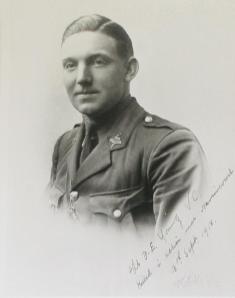Frank Edward Young (VC) facts for kids
Quick facts for kids
Frank Edward Young
|
|
|---|---|

Second Lieutenant Frank Edward Young
|
|
| Born | 2 October 1895 Cherat, North West Province, British India |
| Died | 18 September 1918 (aged 22) Near Havrincourt, France |
| Buried |
Hermies Hill British Cemetery, Pas-de-Calais
|
| Allegiance | |
| Service/ |
|
| Years of service | 1909–1918 † |
| Rank | Second lieutenant |
| Unit | Hertfordshire Regiment |
| Battles/wars | World War I |
| Awards | |
Frank Edward Young (born October 2, 1895 – died September 18, 1918) was a brave soldier who received the Victoria Cross. This is the highest and most important award for courage given to British and Commonwealth soldiers. It is given for amazing bravery when facing the enemy.
Contents
Early Life and Army Start
Frank Edward Young was born in Cherat, British India in October 1895. His father was also a soldier. Frank came back to Britain for school.
In November 1909, when he was 14, he joined the Hertfordshire Regiment. He started as a Boy Bugler. This meant he played the bugle and was a part-time soldier.
Fighting in World War I
When World War I began, Frank was not healthy enough to go overseas. He had an operation. In January 1915, he was fit to fight. He joined the 1/1st battalion Hertfordshire Regiment. This group was part of the British Expeditionary Force on the Western Front in France.
Frank's father had also rejoined the army. He was the main sergeant for the same battalion. Both father and son fought in battles in 1915. These included the Battle of Festubert and the Battle of Loos. During this time, Frank was promoted to Sergeant.
In 1916, he became an instructor. He taught soldiers how to use bombs. He was hurt in an accident but got better. After recovering, Frank was chosen to become an officer. He became a second lieutenant on April 27, 1917. He then trained with the Royal Flying Corps.
Frank returned to the infantry (foot soldiers). He rejoined his old battalion in France on September 12, 1918. He was put in charge of No. 4 Company.
His Victoria Cross Action
Second Lieutenant Young earned his Victoria Cross for his actions on September 18, 1918. This happened near Havrincourt, France. His battalion was in the front lines near a small forest called Triangle Wood.
In the late afternoon, German troops attacked. They started with heavy artillery fire. The enemy managed to get a small hold at first. But Frank's battalion held their ground and made the Germans retreat.
Frank's bravery and leadership during this defense earned him the Victoria Cross. He was given the award after he died. The official story of his bravery was published on December 14, 1918. It said:
"2nd Lt. Frank Edward Young, late 1st Bn., Herts. R. (T.F.).
For most conspicuous bravery, determination and exceptional devotion to duty on 18th September, 1918, south-east of Havrincourt, when during an enemy counter-attack and throughout an extremely intense enemy barrage he visited all posts, warned the garrisons and encouraged the men. In the early stages of the attack he rescued two of his men who had been captured, and bombed and silenced an enemy machinegun. Although surrounded by the enemy, 2nd Lt. Young fought his way back to the main barricade and drove out a party of the enemy who were assembling there. By his further exertions the battalion was able to maintain a line of great tactical value, the loss of which would have meant serious delay to future operations. Throughout four hours of intense hand-to-hand fighting 2nd Lt. Young displayed the utmost valour and devotion to duty, and set an example to which the company gallantly responded.
He was last seen fighting hand to hand against a considerable number of the enemy."
Frank Young was first listed as missing. But his body was found on September 27, 1918. It was at the edge of Havrincourt Wood. He was later buried in Hermies Hill British Cemetery, Hermies. His grave is at location 3B5.
Where to See His Medal
Frank Edward Young's Victoria Cross medal is on display. You can see it at the Bedfordshire and Hertfordshire Regimental Collection. This collection is located at the Wardown Park Museum in Luton, Bedfordshire.
 | Roy Wilkins |
 | John Lewis |
 | Linda Carol Brown |

